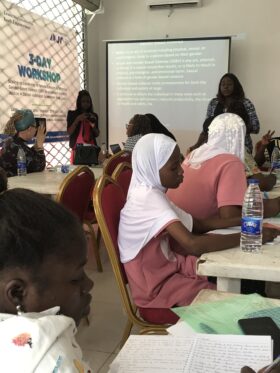News
NGO sensitises women on gender-based violence

The Leadership Initiative For Youths Empowerment (LIFE) a Non-Governmental Organisation (NGO),h has begun a three-day sensitisation workshop on Gender Based Violence and human rights for no fewer than 32 young women in Lagos State.
Our correspondent reports that the sensitisation workshop held at Envougue Plaza, Okota, Lagos State.
Gender-based violence (GBV) is violence committed against a person because of his or her sex or gender.
It is forcing another person to do something against his or her will through violence, coercion, threats, deception, cultural expectations, or economic means.
Chibogu Obinwa, a Facilitator and Gender, Development and Civil Society Specialist, in her introduction, urged young women to be catalysts for change, and ask salient questions that can further improve the quality of life for women and human rights.
According to her, gender roles are propaganda made popular by the society, hereby limiting women by extension this keeps away from exploring and attaining their individual potential.
“Human rights is an entitlement for every human being, but it does not encapsulate the daily challenge of the modern woman; as women, we face a lot of limitations, inequalities.
“As young minds, we should understand what laws are in place to protect us as women and how to get justice. Speaking up as an agent of change is necessary in our immediate society.
“Speak up against Domestic Violence, Female Gender Mutilation, Emotional and Verbal Abuse, inequality and poor representation during policy formulation.
“Women are susceptible to a lot because culture and religion make it difficult for women to ask questions that can liberate them,” she said.
Ogechi Stephens, Programme Officer and also one of the facilitators, told the participants that vulnerable individuals in the society should be protected.
“Vulnerability affects both young and old, even a woman in her forties is still vulnerable to all sort of abuses, especially minors who can’t speak for themselves.
“When we as a society come together to frown at illegality and injustice, then the vulnerable ones will be protected. They have rights just like every other person too.
“There are levels to GBV, there’s physical violence, emotional violence, sexual violence and psychological and mental violence. We need to focus on the crime and stop shaming victims of these crimes.
“Law enforcement agencies need reorientation; shame is one of the tools the society uses to silence victims. There are centers that take care of victims like Mirabel Center, Ireti Center and so many others.
She further told participants to educate their families and friends, in the case of rape and that gathering evidence played more important role than emotions.
“Nobody prays for rape, but it happens. Ensure that the victim doesn’t bath; get them to get a swab of the body fluid from the rapist.
“Often times people get emotional which is understandable but the court only deals with fact, to make the case easy, gather enough evidence,” she advised.
On why there were no male participants, Stephens told our correspondent that there were other programmes for the foundation that focused on both men and women, including peace building.
She, however, noted that young boys would also be educated about their rights and duties.
Omolola Oni, the Media Coordinator of the NGO, also advised that people who had suffered from any form of abuse should seek help, “so they don’t end up hurting other people unconsciously”.
“There’s a saying which says `hurt people hurt other people’.
“Seek professional help or talk to someone you trust, confide in them, healing comes from sharing,” she said.
Anuoluwapo Adegoke, a graduate and one of the participants, told our correspondent that she had learnt the need to speak up for herself and for others who had yet to find their voices.
Ugochi Awujo, a Self Employed Graduate, said she learnt to ask questions about traditions and societal expectations from women.
“Often times, women are told what they can and can not do, but now, I strongly believe that a woman can do and be anything that she wants as long as it’s not illegal,” she said.
Deborah Irabor, a Student, told our correspondent that she has learnt the difference between sex and gender in the course of the training.
“Sex means male or female; these are the biological differences between a male and a female, while gender is the perceived expectations of the society from us.
“For instance a woman should be a homemaker, some women are not wired to be homemakers irrespective of what the society projects,” she said.
Our correspondent reports that the LIFE foundation has the mission to empower the youth, girl child and other vulnerable females on issues around GBV and human rights.




 Davido's Net Worth & Lifestyle
Davido's Net Worth & Lifestyle 
